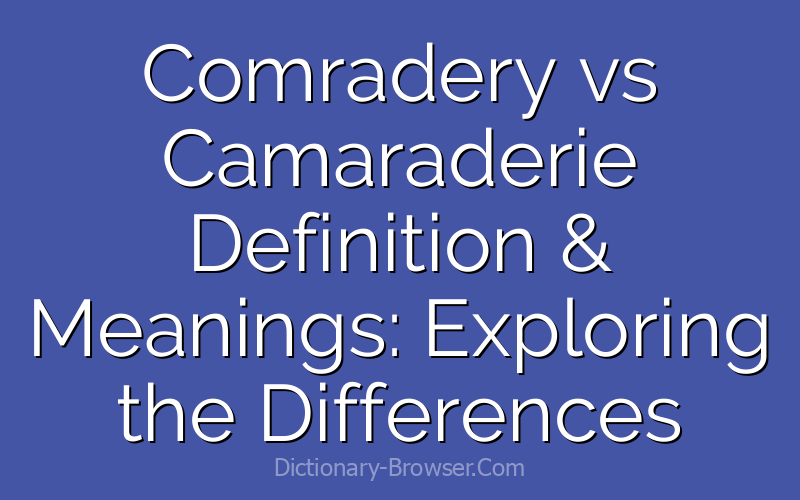Creating a cohesive and harmonious environment within a group or team is crucial for achieving collective success. The concepts of camaraderie and comradery are often used interchangeably, but do they have distinct meanings? In this article, we will delve into the definitions and meanings of comradery vs camaraderie, unravel their subtleties, and explore their significance in fostering strong relationships and teamwork.
Comradery vs Camaraderie Meaning & Definition:
Camaraderie Definition
Camaraderie is commonly defined as a sense of trust, loyalty, and goodwill among individuals who share a common purpose or experience. It is characterized by a warm and friendly atmosphere, where individuals support and uplift each other. Camaraderie is often found in settings such as workplaces, sports teams, military units, and social groups, where people work or engage together towards a shared goal.
Comradery Definition
Comradery, on the other hand, refers to a deep and profound bond between individuals who have undergone challenging or demanding experiences together. It emphasizes a mutual understanding and empathy that arises from shared hardships or sacrifices. Comradery is frequently associated with military units, emergency response teams, or individuals who have faced adversity together.
Distinguishing Factors
While both camaraderie and comradery involve a sense of unity and connection, their differences lie in the nature of the bonds formed. Camaraderie tends to focus on the positive aspects of collaboration, fostering a supportive and friendly environment. Comradery, on the other hand, is born out of shared struggles and challenges, resulting in a deeper level of camaraderie.
Synonyms for Camaraderie / Comradery
- Fellowship
- Comradeship
- Solidarity
- Unity
- Harmony
- Bonding
- Mutual support
- Esprit de corps
- Team spirit
- Rapport
Antonyms for Camaraderie / Comradery
- Hostility
- Conflict
- Animosity
- Rivalry
- Disunity
- Discord
- Alienation
- Division
- Estrangement
- Distrust
How To Use Camaraderie In A Sentence
- The members of the basketball team developed a strong camaraderie through their shared practices, victories, and challenges.
- The soldiers formed a deep camaraderie during their deployment, relying on one another for support and protection.
- The office environment encouraged camaraderie among employees through team-building activities and regular social events.
- The theater troupe’s camaraderie was evident in their seamless performances and the genuine support they showed each other.
- The hiking club fostered camaraderie among its members by organizing group hikes and providing opportunities for shared experiences.
Comradery Meaning, Definition, and Example Sentences in detail.
The Significance of Camaraderie and Comradery in Group Dynamics
Camaraderie and comradery play pivotal roles in shaping group dynamics and influencing the overall productivity and satisfaction of its members. Let’s explore the significance of each in more detail.
Camaraderie: Building a Positive and Supportive Environment
Camaraderie is essential in fostering a positive and supportive environment within a group or team. When individuals feel a sense of camaraderie, they are more likely to communicate openly, share ideas, and collaborate effectively. This positive atmosphere encourages creativity, innovation, and a sense of belonging, leading to increased job satisfaction and productivity.
Promoting camaraderie within an organization can be facilitated through various initiatives, such as team-building activities, social events, and recognition programs. By nurturing a culture of camaraderie, organizations can create an environment where individuals feel valued, motivated, and supported, ultimately contributing to the overall success of the group.
Comradery: Forging Strong Bonds through Shared Experiences
Comradery, rooted in shared hardships or demanding experiences, holds a unique place in group dynamics. When individuals go through challenging situations together, a deep bond is formed based on trust, reliance, and understanding. This bond not only strengthens relationships but also enhances collaboration and teamwork.
In contexts such as military units or emergency response teams, comradery can be a lifeline during high-stress situations. The shared experiences create an unspoken understanding among individuals, enabling them to work seamlessly and make split-second decisions. Comradery serves as a pillar of support and resilience, instilling a sense of unity that allows teams to overcome obstacles and achieve their objectives.
FAQs About Comradery vs Camaraderie
What is the main difference between camaraderie and comradery?
Camaraderie focuses on building a positive and supportive environment, emphasizing trust and goodwill among individuals. Comradery, on the other hand, is born out of shared hardships or demanding experiences, fostering a deeper bond based on mutual understanding and empathy.
Are camaraderie and comradery interchangeable terms?
While camaraderie and comradery share similarities, they are not entirely interchangeable. Camaraderie refers to a general sense of unity and support, whereas comradery specifically pertains to the deep bond formed through shared challenges.
How can organizations promote camaraderie among their employees?
Organizations can promote camaraderie by organizing team-building activities, fostering open communication, recognizing and appreciating individual contributions, and creating a positive work culture that values collaboration and mutual support.
In what contexts is comradery commonly found?
Comradery is often found in contexts such as military units, emergency response teams, or individuals who have faced significant challenges or adversity together.
Can camaraderie and comradery coexist within a group or team?
Yes, camaraderie and comradery can coexist within a group or team. Camaraderie forms the foundation of a positive and supportive environment, while comradery strengthens relationships through shared hardships and experiences.
Why are camaraderie and comradery important for group success?
Camaraderie and comradery enhance collaboration, trust, and communication within a group or team. They contribute to higher job satisfaction, improved productivity, and the ability to overcome challenges collectively.
Also, check the Camaraderie meaning in Merriam-Webster.
Follow our Dictionary on Tumblr.
Conclusion
In conclusion, camaraderie and comradery are two concepts that share the goal of fostering strong bonds within groups and teams. While camaraderie focuses on building a positive and supportive environment, comradery emphasizes the deep connections formed through shared hardships. Both concepts are vital in creating cohesive and successful groups, whether in the workplace, sports teams, or other collaborative settings.
Understanding the definitions and meanings of comradery vs camaraderie allows us to appreciate their significance in group dynamics. By promoting camaraderie and fostering comradery, individuals, and organizations can cultivate an environment where trust, collaboration, and mutual support thrive, leading to shared success and fulfillment.
Our website (English Dictionary Browser) provides meanings, synonyms, antonyms, and examples of commonly used words. It serves as a resource to expand vocabulary, improve understanding, and enhance language skills.
Dictionary Browser website helps users explore alternative words, discover related terms, and grasp the nuances of language usage. They enable individuals to communicate effectively and express themselves more precisely and clearly.
Share this information in social media and groups so that more people can also take advantage of this informative resource because sharing is caring.

